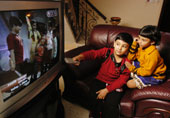 |
| LONG NIGHTS: Children often end up watching television late into the night |
Sunny Kundu, 6, is afraid of the dark. He has frequent nightmares, and his father, a Calcutta-based insurance agent, is worried that he doesn’t sleep well enough. “His recurring nightmares seem to shorten his periods of sleep. If this continues, his health might be severely affected,” father Sabitra Kundu says about his son.
There was a time when Sunny’s problems would have been shrugged off as routine. But recent studies on insomnia in children have rudely woken up the Indian paediatric community. About 43 per cent of children suffer from sleep-related disorders, says a study conducted by doctors of the Institute of Paediatric Medicine at the Post Graduate Institute of Medical Education and Research in Chandigarh.
“School-aged children are traditionally assumed to be good sleepers, yet evidence from recent surveys as well as our study do not support this assumption,” says the study by Bhavneet Bharti, Prabhjot Malhi and Sapna Kashyap and published in the Indian Journal of Paediatrics in January this year.
The findings are being endorsed by other experts, though there are some who feel that the Indian study is too restrictive. “The sample size is small and some of the sleep-related problems are still being debated,” says Debashis Roy of Apollo Clinic in central Calcutta.
But Gautam Ghosh, consultant paediatrician at Shree Jain Hospital and Research Centre in Howrah and a former lecturer at the Institute of Child Health in Calcutta believes that the results of the study are particularly relevant considering that the children were otherwise healthy.
He points out that a similar picture emerged in a study that was published last year in the Journal of Abnormal Child Psychology ? the official publication of the International Society for Research in Child and Adolescent Psychopathology, a web-based consortium of American psychiatrists. “While the Indian study surveyed 103 children, the American study had a sample size of 980 and the combination lends credence to the problem,” Ghosh stresses.
The focus of the Indian study was on children aged between three and 10 years. The study enumerated several problems related to disturbed sleep such as bedwetting, talking or clenching teeth while sleeping, nightmares, night terrors and snoring. It showed that 18.4 per cent of children indulged in bedwetting, 14.6 per cent in sleep talking, 11.6 per cent in teeth clenching and 6.8 per cent had nightmares.
The recent trends of urbanisation, family nucleation and working-parents culture has altered the traditional social fabric of our society, which in turn might adversely affect the conundrum of common childhood behavioural problems including sleep,” the study said.
Bishwojit Bhaduri, consultant paediatrician and neonatal surgeon at the West Bank Hospital in Calcutta, believes that insomnia among children is “rising alarmingly” in the city. He points out that heavy exposure of children to the electronic media can cause behavioural disorders leading to insomnia. “A child has lots of energy but owing to a lack of playground space is forced into activity at night, causing problems both for him and his family,” he says.
Child psychiatrists caution that sleep-related disorders may lead to other problems. “A child who does not get enough sleep is likely to be somnolent in school and invite criticism from teachers,” says A.K. Manglik, a paediatrician at Ankur Clinic in east Calcutta.
Many believe that pressures in school aggravate sleep-related problems. “I come across children who start studying from 11 at night and go on till 3 am,” says Ronodip Ghosh Roy, consultant psychiatrist at Charing Cross Hospital in Kankurgachi, east Calcutta. “I know a class IV child whose daily academic routine starts at 6 am and extends to 3 am.”
Life outside school is not much better either. Non-academic activities ? such as sports ? are becoming bitterly competitive, leading to high levels of stress and insomnia. Says Dipankar Mukherji, a clinical psychiatrist in Shyambazar in north Calcutta: “If a child is under constant duress to become a second Sourav Ganguly, would he be able to relish the soothing effects of bed-time stories like Thakumar Jhuli?”
There are other reasons, too, for the rise in insomnia. Aniruddha Deb, consultant psychiatrist at Crystal Clinic in south Calcutta, points out that changes in working shifts in adults can precipitate insomnia in children. “We have reached a stage when it is not abnormal for working adults to return home after 11 at night. Since Indian children tend to sleep with their parents, the young ones suffer from the late-night activities of parents,” he says.
So it’s not surprising that five-year-old Shabdita talks in her sleep.
She goes to bed at midnight after watching television with her father, a Calcutta-based businessman, who comes home late. “Shabdita does not seem to realise that she is talking. I am worried that this is an abnormal behaviour that may cause harm in the long term,” says father Pritam Dasgupta.
The situation is worrying, but doctors believe that there are solutions to the problems. “Making a child understand that he is important to a family can alleviate many problems connected to insomnia,” says Priyanka Basak, clinical child psychologist at AMRI hospital in Dhakuria, south Calcutta.
However, the study has undoubtedly released pointers for further research and exploration, and it remains to be seen how swiftly adults wake up to tackle the problem. Till then, though, Shabdita may go on talking in her sleep, and Sunny continue to be scared of the dark.
Major causes of child insomnia
• Insecurity
• Peer pressure to perform in all kinds of activities
• Parental pressure
• Academic pressure
• Decline of joint family
• Unscientific teaching methods in kindergarten schools
Possible remedies
• Acknowledgement of the problem by parents
• Counselling
• Non-authoritarian methods of toilet training
• Sport
• Recognising that sleep related disorders are curable
• Psychotherapy
• Behavioural rather than medical treatment










